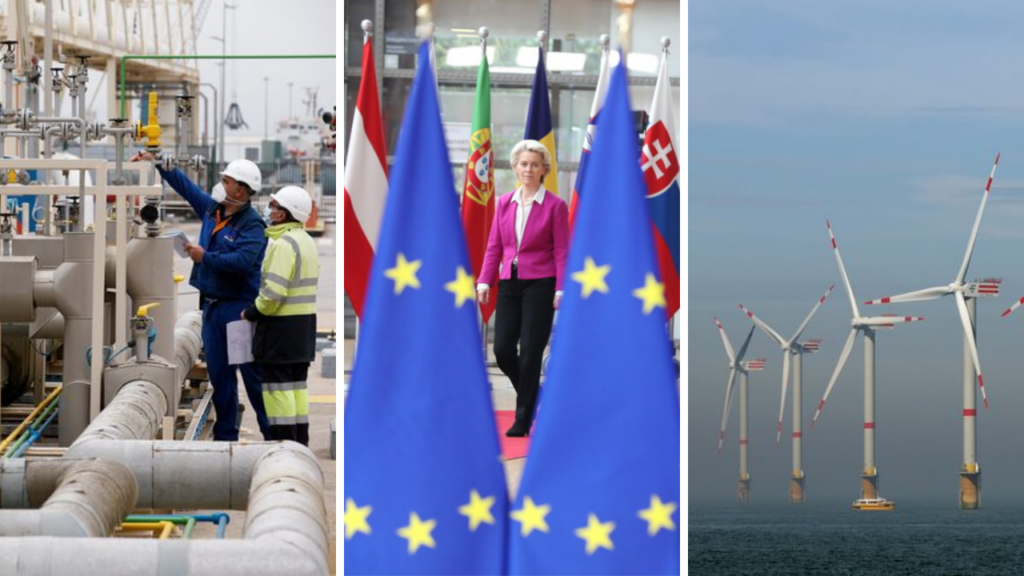European energy ministers will meet in Brussels today to discuss emergency measures to bring down electricity and heating bills, based on the five-point plan proposed by the European Commission in the run-up to the summit.
The various energy ministers will meet to discuss a common approach to tackle the continued rise in prices, something that individual Member States are unable to deal with on their own (as repeatedly underlined by Belgian Prime Minister Alexander De Croo in the past few weeks).
"Today, the Energy Council can send a strong signal to the European Commission," Belgian Energy Minister Tinne Van der Straeten wrote on Twitter. "With a dynamic price cap on gas, we provide financial breathing space for families and businesses and remain competitive with other import markets such as Asia."
The discussion will centre around the five "immediate" moves that EU Member States can make, as proposed by the Commission. While Van der Straeten said that some of them speak for themselves, others will be more controversial.
Price caps complicated by global markets
"A cap only on Russian gas will not bring the price down. Imports of Russian gas into Europe have fallen from 40% before the war to 9%. The impact on prices of a cap on all gas will be a drop not only on that 9% but also on the other 91%."
Consequently, Belgium will also argue for a price ceiling for gas from Norway or the United States, which will then have to be linked to the Asian market so European countries are not outbid on that front.
Additionally, a general price cap would be a more prudent approach than specifically targeting gas coming from Russia, as President Vladimir Putin had already threatened to turn off the gas tap completely if it came to that.
Van der Straeten stressed that a general price cap could be put in place swiftly if the EU works with the European Emergency Procedure. "The aim is to propose a gas price cap to the EU Commission after the Council and ask them to come up with a workable proposal by 15 September."
Difficult discussions ahead
If the EU ministers agree on the measure, it would take around six to ten days to become effective. However, Germany is not in favour of a general price cap as it fears that it would threaten the security of supply. A further complication is the close link between electricity and gas markets (the high price of gas determines the price of electricity).
The European Commission also proposed a price cap on all renewable energy sources and nuclear energy (all electricity not generated from gas), as these producers currently reap huge profits because they can charge the high market price without having to bear the high costs of the gas-fired producers.
Member States could skim off those excess profits above a certain price level – the figure of €200/MWh is reportedly circulating – and use that money to ease the bills of vulnerable families. While Van der Straeten is in favour of this measure, it could easily go further.
Other proposals, such as (voluntary) electricity cuts, extra support for energy traders and a solidarity contribution from the fossil sector will probably be easy for ministers to agree on.
Related News
- Belgium risks 'ending up in a war economy' without EU help, warns De Croo
- Belgium will 'pull out all the stops' to lower energy prices
- European Commission proposals 'not enough' to lower energy prices
In the meantime, Greenpeace EU campaigner Thomas Gelin stated that any plans to combat the energy crisis decided on now will be "too little, too late," adding that some of the measures being discussed risk exacerbating climate breakdown, energy poverty and war.
Governments must prioritise the most vulnerable this winter, save energy by cutting waste and reducing demand, and shift away from fossil fuels to renewables. Gelin argues that now is the time to end the fossil fuel era for good and to get serious about cutting energy waste.
"A massive home insulation programme would greatly diminish energy demand so that we have a chance of withstanding the havoc of the climate crisis in Europe and around the world."
Today's consultation is not the end of the road: after the summit, the Energy Ministers will compile their feedback for the Commission, which will then present detailed proposals on 13 September in Strasbourg.

